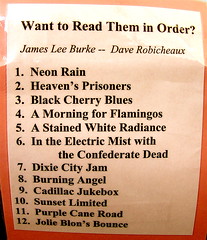What happens when you tell people you’re a writer? Do they ask if you’ve had anything “published”? Like, “Well… so what. You write stuff, but well… come on. I don’t see your shit in the bookstore.” Do you get those vibes?

- Image by Lester Public Library via Flickr
That really irks me. To me, if you write, you’re a writer. You become a professional writer the minute you’re paid, but that doesn’t validate you. What does validate you is writing for other people.
If you’re hiding your writing in a drawer somewhere, that’s not cool. If you write for yourself, that’s OK, but you’re a diarist, not a writer. Does that make sense? You need to have the courage to get your stuff out there if you want to call yourself a writer. Writers write for themselves, too, but they SHARE. That’s the distinction to me.
But don’t let your loved ones tell you that your writing sucks. Most aren’t experts. Plus, you don’t know what their ulterior motivation for wanting you to fail might be. That’s not to say that your family is plotting against you, but for example, a husband might not want his wife to be a “glamorous writer.” It’s too threatening. Of course, glamor doesn’t come unless you’re very lucky and find the right editor.
So, that’s who you need to be courting… editors. They should be the only judges you care about. If they say your stuff isn’t good enough (and they will for a while, no doubt), don’t allow it to get you down. Just keep trying. And when they start writing comments on your manuscripts, you’ll know you’re getting closer to the mark. Take what they have to tell you to heart and edit your manuscript accordingly. Editors are the people who will be buying your work, and getting a rejection letter will sting at first, but you’ll get over it. Just keep putting stuff in the mail.
I’ve read countless stories of authors who sent manuscripts out over and over and were rejected many, many times. And I can include myself in that list. It took me FOUR YEARS to learn the business and techniques of writing professionally before an editor bought my work. Four years! And really, isn’t James Lee Burke a great example? Every time I got a rejection letter, I thought of him. After 53 rejections, HE won an award. It’s an interesting story, and you should read about his struggle sometime for inspiration. It will make you feel better, honestly.
Here’s my take on the whole publishing thing: You just have to find the right editor that vibes with what you write.
It’s really that simple. A bad hair day or too much drinking the night before can change an editor’s whole outlook on what you’ve written. Or, maybe they’re just overwhelmed with work, so they’ll send a bunch of stuff back just to get it off their desks. It’s NOT personal, and it may not have anything to do with your writing at all.
So, don’t let loved ones or anyone without previous publishing experience tell you that you can’t do it. You might hear all kinds of criticism from idiots that just don’t know. Just don’t listen! And don’t let rejections get you down. It’s all part of being a writer. Goes with the territory.

